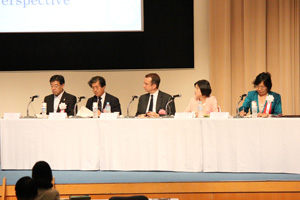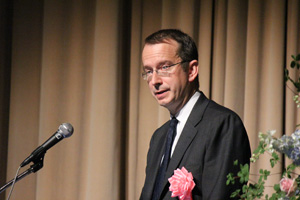The Japan Exchange and Teaching programme (JET) is 25 years old! During that time, more than 50,000 people from around the world have gone to Japan, most as English teachers in junior and senior high schools, some to coordinate international relations in local government offices. This is an extraordinary number, which deserves admiration, both as a remarkable demonstration of generosity on the part of the Japanese Government and people and as probably the most extensive project of grass-roots internationalization the world has ever seen.
|

Anniversary symposium in Tokyo on 8 September 2011 |
It was a great pleasure, therefore, to be invited to Japan to participate in a day-long anniversary symposium in Tokyo on 8 September, where I was able to share the stage with Yuka Ohama, a former student, who is now an English teacher at a high school in Aichi. During my trip, I was also lucky enough to be able to return to Yamaguchi Prefecture, where I taught 23 years ago, to meet six former colleagues at my base school in Iwakuni and to give a talk to – and spend a riotous evening with – the Yamaguchi Japan-British Society.
At the symposium, all the speakers emphasized that the programme has been a triumph of soft power, providing numerous examples to show how it has changed both those who have participated in it and Japan itself.
|
For many participants, including myself, the programme has been life-changing, with the field of Japanese Studies, for example, now populated by ex-JETs. And JET has clearly changed Japan. Ohama-san underlined how significant it can be for students, particularly in rural communities, to have a foreign teacher not only in the classroom but simply around.
But we also emphasized that times have changed and that JET has to evolve. From the beginning, there have been questions about the teaching part of the equation, with the goals of the programmes and of English language education often seeming at odds. Much has changed with respect to the latter, but university entrance exams remain preoccupied with grammar and translation – and cast a long shadow. Throughout the symposium, too, there was the looming question of whether JET can be sustained, given the strained circumstances of national and local budgets. |

Angus Lockyer
|
None of this should detract from the achievements of the programme or the prospects for its future. It remains an extraordinary opportunity, both for participants seeking a challenging next step in life and for Japan as it adapts to an ever more globalized world. Everyone is agreed that Japan continues to need something like JET. But what JET might become is up for grabs. And however it continues, it is clear that a programme like JET needs qualified, committed applicants to make the most of the opportunities it provides.
Angus Lockyer
Department of History
SOAS, University of London
|
|

